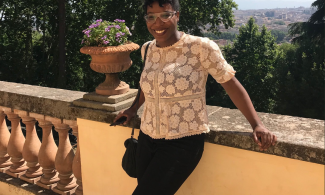
Arimah emphasised that African writers should centre the African gaze. To her fellow shortlisted writers, she said: “Your stories have added to the profile of African literature, adding the many voices that we need to illuminate who we are.

Lesley Nneka Arimah has won the 20th edition of the Caine Prize for African Writing for her short story, ‘Skinned’.
The prize was launched in 2000 and is awarded annually to an African writer of a short story published in English.
The winner receives £10,000 prize money, and each shortlisted writer also receives £500, The Guardian reports.
Also on the shortlist this year were Meron Hadero (Ethiopia) for ‘The Wall’, Cherrie Kandie (Kenya) for ‘Sew My Mouth’, Ngwah-Mbo Nana Nkweti (Cameroon) for ‘It Takes A Village Some Say’, and Tochukwu Emmanuel Okafor (Nigeria) for ‘All Our Lives’.Arimah, winner of the 2015 Commonwealth Short Story Prize for Africa, has twice been shortlisted for the Caine Prize before in 2016 and 2017.
In her acceptance speech, Arimah emphasised that African writers should centre the African gaze. To her fellow shortlisted writers, she said: “Your stories have added to the profile of African literature, adding the many voices that we need to illuminate who we are.
“When I think of what literature can do, and I think of the ways that literature has changed minds and opened imaginations, I want to say that we African writers must centre the African gaze. We must centre the Nigerian gaze, the Cameroonian gaze, the Ethiopian gaze, the Kenyan gaze. We need to be writing to and for each other, and we also need to play.
“And what I mean by play is that when one knows a thing inside and out, say cooking, the chefs who do fusion cooking do so because they know both cuisines that they are using intimately.
“I think of experimentation as the sign of expertise. And I think it’s important we continue as we have started, as we have been, as we are doing always, that we continue to play within the bounds of our literatures. And I emphasise 'each other' because, yes, we must centre the African gaze. Thank you so much.”